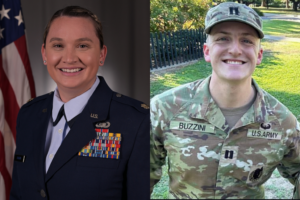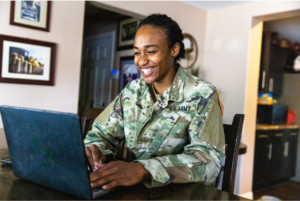Oksana Tsykova is a public service leader deeply committed to equitable justice. As Director of the Conflict Panel in Contra Costa County, she oversees a team of more than 80 attorneys, experts, and investigators, managing a multimillion-dollar budget to deliver indigent defense services. The 2025 graduate of the USC Price Master of Public Administration Online program reflects on how the program has sharpened her leadership, expanded her policy skills, and reinforced her belief in public service as a calling.
Q: What factors motivated you to further your education? Did something change in your career, work environment, or in your field?
A: I decided to go back to school after many years for a number of reasons. First, in my new position, I had the responsibility of managing staff, improving the quality of our program, interfacing with the stakeholders and managing a multimillion dollar budget. I was motivated to continue my education to broaden my knowledge of public and nonprofit administration, through a theoretical and practical application of skills that apply to an administrator. This included budget planning, budget negotiations, strategic planning and leadership training.
Second, with my new position came the opportunity to make an impact on the policy level. Working with state-wide stakeholders to improve the quality of indigent representation and also facilitate institutional changes through historic legislation such as the Racial Justice Act. Being able to work with different stakeholders in the state allows me to make a small contribution to the legal and procedural framework in the state, as it relates to court-appointed work and indigent representation.
Q: What is indigent defense?
A: Indigent defense means providing attorneys to people who can’t afford one—those who are constitutionally entitled to representation in cases like criminal trials, probate hearings, witness representation, and immigration matters. My job is to make sure those attorneys are available, trained, and ready to step in when someone needs help. But it also means managing a full panel—which right now includes about 80 attorneys, investigators, and experts—and running a program with a multimillion-dollar budget. That’s what made me realize I needed to come back to school and build up my skills.
Q: How did you hear about USC Price’s Online MPA programs, and what drew you to it?
A: Once I decided to pursue my Master’s Degree, I explored different options, including programs at UC Berkeley. What ultimately made me choose between that program and USC was looking at the curriculum of classes and recognizing that USC was offering a much more hands on program, with classes that spanned from analytical sources like statistics, economics and public budgeting to program and policy analysis, strategic planning and urban planning.
The curriculum that USC had to offer was exactly what I was looking for – not just an executive type of education but an in depth Master’s program that covered all facets of public administration. As a working professional, I also appreciated the flexibility of the online program because it allowed me to take classes in the evenings and interface with classmates across the United States.
Q: Was there a particular course or professor that made a strong impact on you?
A: I honestly think every class brought value. But if I had to choose, I’d say the strategic planning course really stood out. We worked on a project for the City of Indian Wells, and we got to evaluate and build out a strategic plan for them. It was such a unique experience because I didn’t come from a city management background. It really opened my eyes.
The most challenging project was the capstone, where we evaluated NATO military spending across 32 countries. We worked under the program director, Dr. Dora Kingsley Vertenten, and it was just a huge undertaking—political, legal, economic research—but it’s incredibly impactful. Professors like Dr. Dora, Dr. Leach, Professor Musso, and Professor Rawlings have all played a major role in my growth. They’re accessible, they push you, and they genuinely care.
Q: What were some of your professional development goals for the program and beyond?
A: Honestly, I’ve already reached a big goal—gaining the tools I needed to lead my program better. I’ve also started working with the State Public Defender’s Office on developing policy, which I’m really excited about. Moving forward, I want to use my skills to make improvements in public law and administration—locally, but also at the state level. I want to bring strategic planning and sound budgeting into our work, and continue advocating for meaningful policy change.
Q: Can you tell us about your experience with the flexibility of online learning?
A: The online format allowed me to balance full-time work and school, which was crucial. I appreciated connecting with classmates from all over the country—people from Texas, Kansas, Las Vegas—with diverse professional backgrounds. While online learning has its repetitive elements, like discussion posts, the engagement and group projects were valuable. I also took an in-person class with Dr. Musso, which offered deeper conversations. Both formats complemented each other well, and despite being remote, we built a close-knit community.
Q: How did you manage the balance between school, work, and life? What is your work life balance advice?
A: At first, it was tough. There’s definitely a learning curve, especially when you’ve been out of school for a while. The first semester was hard—you have to recalibrate your life and find a rhythm. But once I did, it became manageable.
I had to be realistic with expectations. I made time on the weekends, and my kids would do homework with me. We’d sit together for “study hall,” and I think it was motivating for them to see that even later in life, education matters. It was challenging, but I don’t regret it. As a parent, it also set a good example for my children that pursuing your education older in life is incredibly hard but also rewarding.
Q: How was your interaction/experience with your professors?
A: My interaction with USC professors was nothing but wonderful. The program is small enough where you are able to get to know your professors and they get to know you. There is a genuine commitment from the professors to see you excel in the program and they are always available to help you along the way, either through encouragement, sometimes criticism, but always in a way that let’s you know they care about your success in the program.
Q: How was your experience with your fellow students?
A: My cohort has become a family. Especially with capstone, we were constantly in touch—probably more than I talked to my own family some weeks! We laughed together and sometimes we cried together as we are going through life and the challenges of being a graduate student. This created a very strong bond that I hope to carry with me long after the completion of the program. But seriously, we support each other in every way. Some of us are older, some are just starting out, but we’re all here for the same reason: to make a difference.
Everyone in this program is so driven. These are people who care about public service—not just for a job, but as a calling. And they inspire me every day.
Q: Was there a course that impacted your career the most?
A: One course I’d highlight is Organizational Behavior with Professor Rawlings. It shifted my perspective from managing systems to understanding myself as a leader. We explored our strengths and weaknesses through essays, tests, and group exercises. That kind of personal reflection was powerful—and continues to guide me as I lead my organization.
Q: What are transferable skills that you’ll carry with you in your career?
A: One thing this program reinforced for me—something I probably already knew—is how much we need dedicated public administrators. Public service isn’t just a job. It’s a commitment. It’s a calling.
What really stood out is that no issue is too big or too small. Communities are struggling with all kinds of challenges—homelessness, food insecurity, gaps in education—and public administrators have a role to play in addressing them. It starts with each one of us showing up, bringing ideas, and trying to make things better.
That perspective has been eye-opening. I’ve come to believe that all of us—individually and collectively—can make a difference. I hope to make my own small contribution, and I’m truly grateful to this program for giving me the tools to do that.
Q: Would you recommend the MPA degree online to prospective students? What advice would you give them?
A: I would most certainly recommend the MPA online program to someone who is driven, curious, does not shy away from challenging projects and, most importantly, to someone who is eager to learn about the field of public administration and public service.
You’ll learn skills you actually use—budgeting, leadership, policy analysis—and you’ll work with people who care about making things better. But it’s also demanding. You have to be willing to put in the time and effort. If you do, what you get out of it is an education you’ll value for life—and one that will help you serve your community more effectively.

Master of Public Administration Online
Advance Vital Institutions
Advance your career and the institutions you serve with our exceptional MPA online.
Find Out More


